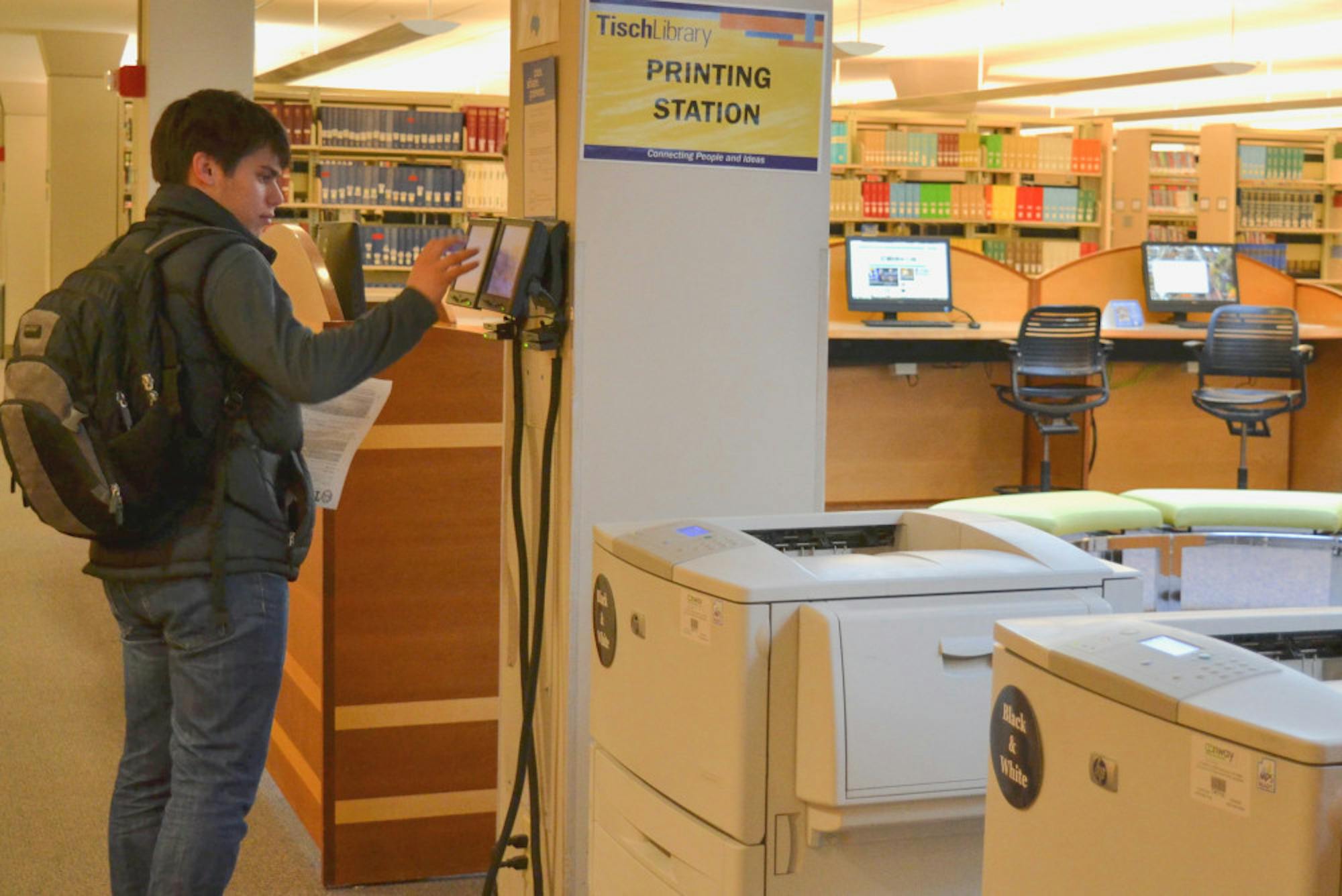The university is considering making changes to its current printing services that would go into effect this fall, amid negotiations for a new student printing contract when the current contract expires on June 30. Part of these negotiations include a survey emailed out to the student body by the Print/Copy Contract Team on Feb. 16.
According to the Feb. 16 email, a team comprised of representatives from Tufts Technology Services, Tufts libraries, Tufts Dining and Tufts Purchasing is considering a contract that would include mobile printing, more printing locations on campus, a subsidized printing allowance of a set number of pages or set monetary amount, as well as the ability to print something and pick up a job at any Tufts "pay for print" printer regardless of where job's computer source is situated, according to team members Tisch Library Associate Director Dorothy Meaney and Director of Client Support Services for Tufts Technology Services Kyle Pope.
"We're trying to develop our RFP (Request for Proposal) for vendors and the kinds of things we're going to ask them to help us think about and whether or not we can implement them," Meaney said.
According to Meaney, a group of Tufts Community Union (TCU) Senate members approached her during the fall semester about reforming campus printing options and gave her a written statement requesting that program changes be discussed.
"It was good timing on their part because the contract is up for renegotiation," Meaney said.
TCU Senator Jacqueline Chen and TCU President Brian Tesser passed a resolution on Sunday that strongly encourages Tufts administrators to have a subsidized printing program in place for students by this fall semester, according to the Daily's Feb. 22 recap of the meeting.
"When I first got elected to [TCU] Senate, a student approached me asking why we didn't have free printing at Tufts and if that was something I could work on in Senate," Chen, a first-year, said.
In addition to having conversations with student government members, Meaney said that the survey sent out last week provided another avenue to gather student feedback.
According to Pope, the Print/Copy Contract Team received 547 responses on the survey within one day. He explained that the team had previously heard people express a desire for 24/7 printing, one of the features listed in the student survey. Within the survey, students are asked to rank what aspects of campus printing are most important to them.
"We've been impressed by the openness of the student body to respond to some of the questions," Pope said.
Changes to printing services were last considered three years ago, and the current "pay for print" system has been in place for 13 years, he said.
Meaney explained that renewing a printing contract is dependent on what is "available from vendors and the capabilities of software and the technology" over a given three-year period.
"This is what we generally do with most of our contracts," Pope said. "We assess whether we want to keep going with the same vendors or if there are other vendors that can provide us with better services, better features, better pricing."
According to Pope, the current contract includes a number of parts including a hardware vendor, a software vendor, printers, paper and toner, along with an employee who checks every weekday to ensure that paper and toner are stocked, and that printers are in acceptable shape.
Meaney said that while the Print/Copy Contract Team has not yet received any vendor proposals, any considerations for printing funding in the new contract need to be "self-sustaining."
"There really is no such thing as free printing," Meaney said. "The paper and the toner and the machines — it has to be paid for in some way."
She explained that free printing that already exists on campus in locations such as Halligan Hall are not under the "pay for print" program, which are not "connected to the rest of the system."
Tufts Director of Dining and Business Services Patti Klos explained that students cannot receive a set number of pages to print from because color printing has different prices from color copying, and the current system sees the monetary amount spent rather than "the actual numbers of images generated."
However, Klos said there is a possibility of giving students who are eligible for free printing a certain monetary allotment for printing a set number of pages through JumboCash, which would be separate from money spent on campus dining.
"But if for some reason you could use that for color printing, if that were $1 per page versus 10 cents, then you might exhaust it more quickly," Klos said. "But a student would make that choice, in my opinion."
Meaney added that research on printing services is currently being done on all Tufts campuses.
"One of the goals of this is to bring together the three campuses because each campus had in the past, kind of done this separately and now we're trying to...make sure it's consistent," Pope said.
University to consider changing printing services for next academic year

Student prints assignment in the Tisch Library printing station on Feb. 24, 2016.





